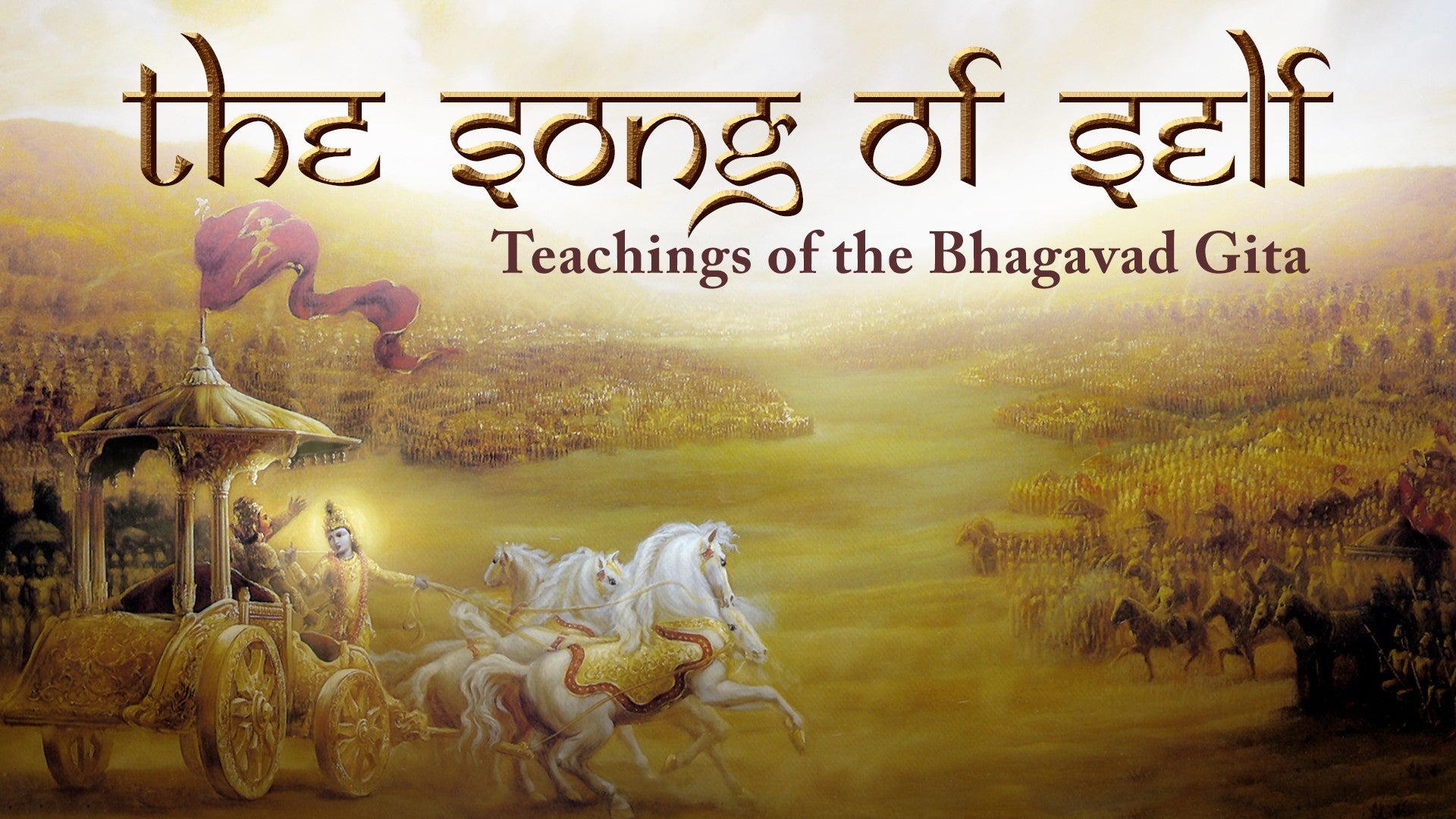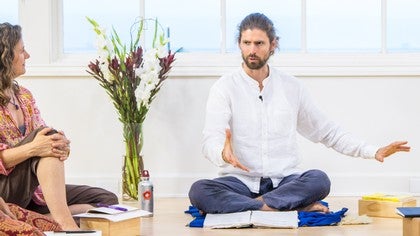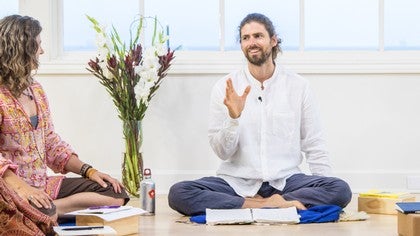Description
About This Video
Transcript
Read Full Transcript
So now in the next section from verses 33 through to 36 really, something rather interesting happens. And on the surface of these verses, it can seem like Krishna is almost contradicting himself. So we'll look at the kind of literal meaning of these verses and then we'll kind of look if we can see beyond the surface and maybe something else is going on here. So I'll recite the four of them together now. is avacyavadanschabahun vadishanti tavahitah nindantas tavasamatyam tathuduktarnukim So, Krishna now says in the 33rd verse, and now if you don't go ahead and engage in this fight that you know is right, if you don't do what you know you need to, then you'll be throwing away your own duty, your own best self, if you like, and kirti, you'll be throwing away your glory. And instead, parpam avapasyasi, instead you will incur parpa. Now this word parpa often gets translated as sin. Now, if we hear the word sin, it probably has different connotations for all of us, but the word parpa in Sanskrit is very beautiful because it's defined very clearly and parpa is an action which causes the person who does it and others to suffer. So in other words, he's saying now Arjuna, if once you know what you need to do, then you don't do it, but you know that's what you need to do and that's really the right thing to do. If you don't do that, then you will throw away your connection to the type of action which is going to be conducive to the sustained experience of wellness. You'll throw away your glory and instead you will invite suffering. I think we can see this is very true, yeah? If we know we need to do something and then we don't, how do we feel about it later? When we go to bed that night, we suffer. So at the, you know, we don't need to dive much beneath the surface here to see that Krishna is speaking very clear common sense to Arjuna. And then another thing that this verse reminds us is that if we know that we need to do something and then we don't, this is not a neutral act. Sometimes people have the idea, oh if I don't do anything then it's no problem, but actually if inside we feel, oh I really know what I need to do and we don't do it, what residual effect is that going to have in our system? Later it's going to come back and bite us, yeah? We're going to suffer for it. So basically once you feel clear conviction about the course of action you need to take, just do it to get on with it. If you don't, it's just going to cause you to suffer. And then it gets very interesting now. Krishna says to Arjuna, akyutin shaavi bhutani kata ye shanti te veyam. Sam bhavita shaaki teer maranara te richite. And if you don't do this, if you don't stand up and fight, then what's going to happen? He says, bhutani, all beings, kata ye shanti, they will tell avyayam forevermore akyutin, your infamy.
So people will say terrible infamous things about you forevermore Arjuna. Sam bhavita shaaki teer maranara te richite. And Arjuna, for people who are esteemed and used to being treated with respect like you, this being gossiped about and people telling of your infamy, that is a fate worse than death, says Krishna. And he continues. Bhayadrenadu paratam mamsyan teedvam maharata, ye shanti tvam bhumato bhutvaya sesilagavam. These great warriors who used to think so highly of you, who used to fear you and respect you, they will say that you withdrew from the battle because of fear. And how will that be? You know, they used to think of you as this great warrior. And now they'll say it's because of fear that you went scampering away from the battlefield.
And ava chavaranschabhoon vari shanti devahitaha, your enemies. They will say things that should never be said about anybody, about you. And they will keep saying these shameful things forevermore. They will defame you most thoroughly, calling into question all your capacities, calling into question your very manhood. What could be worse than that? Now, something a bit shocking here. Earlier, Krishna said, Arjuna, when you're a human being, you can't really predict or guarantee what's going to happen around you. You can only be sure that it's going to be unexpected. So he basically said, just be steady. Other people might gossip about you, other people might say things. No problem, you just be steady. And what's he saying here? Arjuna, if you don't stand up and fight, then people are going to thoroughly defame you forevermore. They're going to speak terrible things about you. And what could be worse than that? So is Krishna contradicting himself? Some people say he is. I don't think so.
Some people also say that, well, what he's done is he's appealed to Arjuna's higher nature, and now he's appealing to his more material or egoic nature. And there may be something in that, but I don't think that's what's going on either. I think what's really happening is Krishna's reminding Arjuna what will happen if he caves in. Maybe in life you've been in a situation where sometimes in life we say, I don't know what to do, I really don't know what to do, but actually we do. It's just that I don't want to do that. That's rather intimidating, rather forbidding, rather scary. But if we don't do it, then how do we feel later? Just like he said in the previous verse, it comes back to smack us. And so what Krishna is really saying here is, yeah, if when you're in a situation and you know what you need to do, but you don't do it, what happens? When you're in that kind of cutting-edge situation, let's say, for example, you're on the battlefield, that old habit that you identified as being harmful, something you wanted to be free of, you have an opportunity to make a choice that changes that and operate in a different way. And a voice inside your head says, no, no, no, no, you can't do that. And if you cave in then, what happens? Then those parts of you that really wanted you to make that shift, it's like they lose heart, yeah, it's so discouraging for them. And those parts of you, those old tendencies that wanted to survive, that wanted to stay entrenched in the limiting pattern, they get cocky, you know, and they get ammunition. So next time you're in that cutting-edge situation and you have the opportunity to break through into a fuller expression of who you really are, it's like those negative limiting voices inside what sometimes in the West people call the inner critic, then it can shout very loudly in very intimidating ways. And I think this is true. It's like when we know what we need to do and we do it, it's like it's bolstering our resolve for the next time we put to the test. But if, however, we know what we need to do and we kind of cave in, then the internal enemies that would keep us entrenched in limiting patterns, it's like they get stronger and they can always remind us of that time we caved in.
So let's say, for example, we're in that situation where we couldn't make the breakthrough and then the inner critic, those voices, those inimical voices of doubt, who were you to think you can do that? You never managed to do that before, forget about it. And in so many different ways, those internal inimical voices can beat down that longing to blossom more into who we really are. So I think this is what's really going on in these verses, and it's very true.
The Song of Self: Bhagavad Gita: Chapter 2
Comments
You need to be a subscriber to post a comment.
Please Log In or Create an Account to start your free trial.











